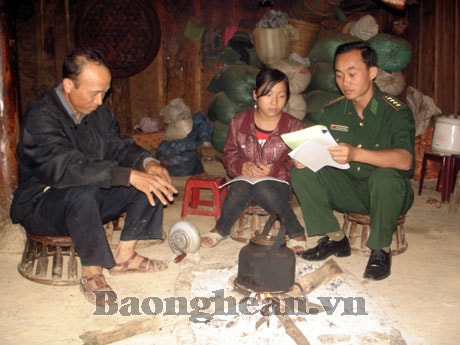Bringing the National Border Law to students in mountainous areas
Nam Can International Border Guard Station, the unit chosen as the starting point for disseminating the National Border Law to 9th grade students, from which it will be widely deployed to mountainous border guard units. For the past 5 years, every week during regular school hours, 9th grade students at Nam Can Boarding Secondary School have a new subject: National Border Law. The teachers in the class are not teachers in the school. Their teachers are soldiers who do mass mobilization work at Nam Can International Border Guard Station.
(Baonghean)Nam Can International Border Guard Station, the unit chosen as the starting point for disseminating the National Border Law to 9th grade students, from which it will be widely deployed to mountainous border guard units. For the past 5 years, every week during regular school hours, 9th grade students at Nam Can Boarding Secondary School have a new subject: National Border Law. The teachers in the class are not teachers in the school. Their teachers are soldiers who do mass mobilization work at Nam Can International Border Guard Station.
The program to disseminate the National Border Law to 9th grade students was initiated by the Border Guard Command in coordination with the Department of Education and Training in early 2007. The documents were drafted by border guards and soldiers. The Department of Education and Training approved it. This is one of the innovations of the border guards and the education sector to raise legal awareness for people in border areas.
Officers of Nam Can Border Post provide legal advice to local people.
Colonel Nguyen Viet Ha - Deputy Political Commissar of Nghe An Border Guard said that the reason for choosing 9th grade students is because at this age, they have the ability to absorb legal content, they have begun to take responsibility for legal actions, and at the same time, they are also collaborators and propagandists to propagate to family members and villagers where they live.
In order to effectively maintain the program of disseminating the National Border Law education to secondary school students, in addition to organizing teaching at schools, border posts have organized extracurricular hours to bring excitement to students. The visits to the border and landmarks organized by the posts, through the introduction of the soldiers, the border landmarks are now no longer lifeless blocks of cement or granite, but have become lively and sacred in the minds of the students.
Stories about the borders and landmarks of the Fatherland are also brought by the children when they go to the fields to work with their families, so that family members can distinguish between their own land and other people's land, so that they can develop production and join hands and unite to preserve the sacred land left by their ancestors.
After 5 years of implementing the National Border Law education program for secondary school students in border areas, the border guards and the education sector have organized for 100% of grade 9 students in schools in mountainous border areas to be disseminated the National Border Law with 316 classes/10,086 students, including 2,944 theory sessions and 232 practice sessions. Through assessment, 100% of students met the requirements, of which 61.9% were rated as good or excellent. It can be said that the dissemination of the Border Law to students in border areas is a completely correct policy. They have actively participated in the mass movement to protect border markers. And they themselves have provided border guards with many valuable sources of information to serve the effective fight against all types of crimes and border protection. Not only that, they are also active propagandists in disseminating the National Border Law to their families, relatives and the communities where they live, thereby helping people in border areas raise their awareness, sense of law compliance and the sacred meaning of territorial sovereignty and national borders of the Fatherland.
Hai Thuong






